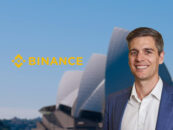
Decentralized Finance (DeFI) Next Growth Phase Will Be Driven by So-Called “MetaFi”
by Fintech News Singapore February 18, 2022The upcoming growth in decentralized finance (DeFi) will be driven by the ability to embed DeFi applications into the open metaverse.
This concept, which venture capital (VC) firm Outlier Ventures refers to as MetaFi, or metaverse finance, will act as the infrastructure layer that unlocks value native to the metaverse, enabling financial inclusion for the creators, gamers and digital natives taking part in this open virtual environment.
In a new report, the VC firm delves into what MetaFi is and explores some of the emerging trends shaping the space.
MetaFi is defined as “an all-encompassing term for the protocols, products and/or services enabling the financial interplay between non-fungible and fungible tokens and their derivatives.” Essentially, the concept incorporates all the key principles DeFi, including composability, unstoppability, and openness to all developers to participate, but brings them onto the metaverse.
According to the report, several developments are fueling the growth of the MetaFi landscape, signaling that the space will be the next growth phase for DeFi.
For one, NFTs have witnessed explosive growth and use-cases are now multiplying, introducing new possible applications of these technologies within the metaverse.
Beyond the hype of multi-million dollars digital art sales, experts have argued that by enabling authentication of possessions, property and even identity, NFTs will be the linchpin of the metaverse economy, and expanding their use to finance-related will be the next growth area.
Projects like Arcade, formerly Pawn.fi, NFTfi, PawnFi and TrustNFT, for example, are providing tools that enable the usage of NFTs as collateral for loans, creating new liquidity for borrowers and lenders.
Investors have taken already notice and shown interest in the prospects of using NFTs as security for a loan. Arcade, for instance, closed two rounds of funding last year – a US$4.5 million seed round in July, and a US$15 million Series A funding round in December –, and South Africa’s NFTfi raised a seed round of US$5 million in December.
Another rising market that falls under the theme of liquidity is the growth of NFT fractionalization, where new platforms are now emerging to facilitate the division of NFTs into fungibles fractions or shares.
PartyDAO, for example, is building a tool called PartyBid that allows multiple parties to pool their capital and bid on a NFT as a collective group, while Fractional.art allows users to break down NFT tokens into the desired amount of shares via a smart contract.
In Asia, Hong Kong and Bangkok-based fintech startup Fraction has taken a different approach, using blockchain technology to turn real estate and other assets into fractional NFTs. The startup closed US$3 million in pre-Series A funding round led by East Ventures last month.
Finally, the rise of gamification in finance and trends like play-to-earn where players receive rewards with real-world value will play in the continued development of the metaverse by enriching gaming economies and open up new possibilities for MetaFi, the report says.
Though at this stage, MetaFi remains a nascent concept, the trend will ultimately allow for the emergence of a “fully-fledged parallel economy bringing hundreds of millions, and eventually billions of users, into the crypto ecosystem over the next decade,” Outlier Ventures predicts.

Illustration of the MetaFi concept, Source: Outlier Ventures
This MetaFi ecosystem will form the financial infrastructure layer of what the VC firm calls the open metaverse. Unlike permissioned metaverses, which are made, owned, and controlled by bigtechs, the open metaverse will be built on Web 3.0 and crypto, and will be owned by builders and users.
A number of players have embarked on the quest of building this so-called open virtual world, with a handful of well-capitalized and staffed projects now dominating the space.
In particular, the report names Decentraland, the first ever Ethereum-based virtual world to launch back in 2015, The Sandbox, another Ethereum-based virtual world platform, and Somnium Space, which has positioned itself as a high-end platform with a focus on building a metaverse designed and optimized for virtual reality.
Last year, The Sandbox closed a massive US$93 million Series B funding round after recording over US$144 million in total gross merchandise volume (GMV) and more than 500,000 registered wallets, while Somnium Space received financial backing from the Winklevoss twins. Meanwhile, Decentraland claims it has been scaling rapidly, witnessing a 3,300% growth in active users over the past year.
Image Credit: Design vector created by macrovector – www.freepik.com






